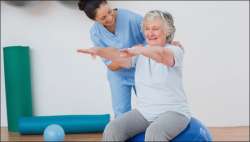Aerobic exercises boost cognitive skills, help prevent Alzheimer’s
Older adults in the non-exercise group faced declines in cognitive function.

Alzheimer's disease (AD) is a brain disorder that destroys memory and thinking skills over time. There is presently no cure for the condition, though treatment options are available.
Engaging in aerobic exercises such as spinning, running, walking may be three times more effective than other types of exercise in delaying the risk of Alzheimer's disease as well as improving cognitive function in older adults, a study has found.
The findings, led by Gregory A. Panza, Exercise Physiologist at the University of Connecticut, showed that older adults at risk for or who have Alzheimer's, who did aerobic exercise by itself experienced a three times greater level of improvement in their ability to think and make decisions than those who participated in combined aerobic training and strength training exercises.
Older adults in the non-exercise group faced declines in cognitive function.
However, those who exercised showed small improvements in cognitive function no matter what type of exercise they did, the researchers said.
Geriatrics experts have for long suggested that exercising can improve brain health in older adults.
The World Health Organization (WHO) has recommended that older adults perform 150 minutes a week of moderate exercise (such as brisk walking), 75 minutes a week of vigorous aerobic training, or a combination of the two types.
The WHO also suggested older adults perform muscle-strengthening exercises on at least two or more days a week.
For the study, published in the Journal of the American Geriatrics Society, the team reviewed 19 studies involving 1,145 older adults that examined the effect of an exercise training programme on cognitive function in the elderly at risk for or diagnosed with Alzheimer's.
Of the participants, in their mid-to late 70s, 65 percent were at risk for Alzheimer's and 35 percent had been diagnosed with Alzheimer's.
(with IANS inputs)